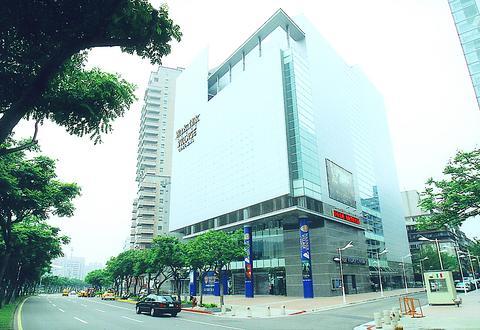Tienmu Warner Village Cinema
The new multiplex, with eight screens and 1,900 seats, is the eighth in a chain of Warner Village Cinemas in Taiwan since the first opened in Taipei's Xinyi district in 1998.
"We are planning to service moviegoers in Tienmu, Shilin and Beitou. As a whole, we look to expand the number of audiences in Taipei and as a result increase movie sales in the region," said Jessie Van Patten

PHOTO COURTESY OF WARNER VILLAGE CINEMAS
The cinema chain accommodates nearly 30 percent of the national market and Van Patten said the Tienmu branch would attract 900,000 to 1.2 million moviegoers a year. Thirty percent, it is expected, will be foreigners.
Costing NT$200 million to build, Tienmu Warner Village -- on the fourth to ninth floors of a building on Zhongcheng Road -- faces Tienmu baseball stadium and the Dayeh Takashimaya Department Store.
To fit in with the suburban lifestyle of Tienmu there will not be too many late-night movies and there will be shopping areas on the first three floors of the building, that will open in August.
Six years ago, Warner Village (with Australian-based Village Roadshow) was the first foreign group to bring multiplex entertainment to the country. UCI, SBC Cinema International and Cinemark have followed.
Recently, however, there have been rumors that Warner Village may be selling its interest in its Taiwan cinemas. Van Patten admitted that the costly facilities and high rents had made life difficult and said each of the eight branches had costs of at least NT$150 million.
"But this will not alter our plans to expand and build new cinemas," she said.

The canonical shot of an East Asian city is a night skyline studded with towering apartment and office buildings, bright with neon and plastic signage, a landscape of energy and modernity. Another classic image is the same city seen from above, in which identical apartment towers march across the city, spilling out over nearby geography, like stylized soldiers colonizing new territory in a board game. Densely populated dynamic conurbations of money, technological innovation and convenience, it is hard to see the cities of East Asia as what they truly are: necropolises. Why is this? The East Asian development model, with

June 16 to June 22 The following flyer appeared on the streets of Hsinchu on June 12, 1895: “Taipei has already fallen to the Japanese barbarians, who have brought great misery to our land and people. We heard that the Japanese occupiers will tax our gardens, our houses, our bodies, and even our chickens, dogs, cows and pigs. They wear their hair wild, carve their teeth, tattoo their foreheads, wear strange clothes and speak a strange language. How can we be ruled by such people?” Posted by civilian militia leader Wu Tang-hsing (吳湯興), it was a call to arms to retake

This is a deeply unsettling period in Taiwan. Uncertainties are everywhere while everyone waits for a small army of other shoes to drop on nearly every front. During challenging times, interesting political changes can happen, yet all three major political parties are beset with scandals, strife and self-inflicted wounds. As the ruling party, the Democratic Progressive Party (DPP) is held accountable for not only the challenges to the party, but also the nation. Taiwan is geopolitically and economically under threat. Domestically, the administration is under siege by the opposition-controlled legislature and growing discontent with what opponents characterize as arrogant, autocratic

When Lisa, 20, laces into her ultra-high heels for her shift at a strip club in Ukraine’s Kharkiv, she knows that aside from dancing, she will have to comfort traumatized soldiers. Since Russia’s 2022 invasion, exhausted troops are the main clientele of the Flash Dancers club in the center of the northeastern city, just 20 kilometers from Russian forces. For some customers, it provides an “escape” from the war, said Valerya Zavatska — a 25-year-old law graduate who runs the club with her mother, an ex-dancer. But many are not there just for the show. They “want to talk about what hurts,” she